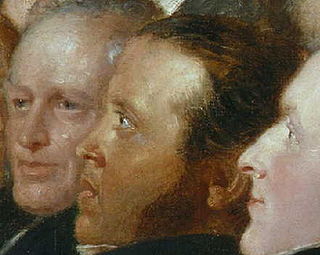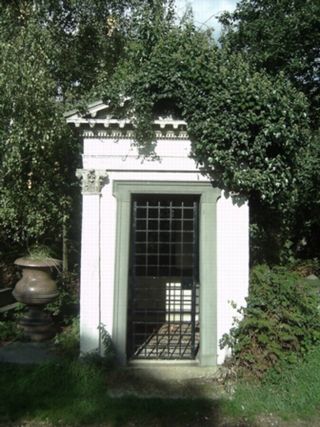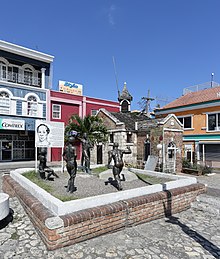
Montego Bay is the capital of the parish of St. James in Jamaica. The city is the fourth-largest urban area in the country by population, after Kingston, Spanish Town, and Portmore, all of which form the Greater Kingston Metropolitan Area, home to over half a million people. As a result, Montego Bay is the second-largest anglophone city in the Caribbean, after Kingston.

The Baptist War, also known as the Sam Sharp Rebellion, the Christmas Rebellion, the Christmas Uprising and the Great Jamaican Slave Revolt of 1831–32, was an eleven-day rebellion that started on 25 December 1831 and involved up to 60,000 of the 300,000 slaves in the Colony of Jamaica. The uprising was led by a black Baptist deacon, Samuel Sharpe, and waged largely by his followers. The revolt, though militarily unsuccessful, played a major part in the abolition of slavery throughout the British Empire.

The Slavery Abolition Act 1833 was an Act of the Parliament of the United Kingdom which provided for the gradual abolition of slavery in most parts of the British Empire. Passed by Earl Grey's reforming administration, it expanded the jurisdiction of the Slave Trade Act 1807 and made the purchase or ownership of slaves illegal within the British Empire, with the exception of "the Territories in the Possession of the East India Company", Ceylon, and Saint Helena. The Act came into force on 1 August 1834, and was repealed in 1998 as a part of wider rationalisation of English statute law; however, later anti-slavery legislation remains in force.

St. James is a suburban parish, located on the north-west end of the island of Jamaica in the county of Cornwall. Its capital is Montego Bay. Montego Bay was officially named the second city of Jamaica, behind Kingston, in 1981, although Montego Bay became a city in 1980 through an act of the Jamaican Parliament. The parish is the birthplace of the Right Excellent Samuel Sharpe, one of Jamaica's seven National Heroes.

Bussa's rebellion was the largest slave revolt in Barbadian history. The rebellion takes its name from the African-born enslaved man, Bussa, who led the rebellion. The rebellion, which was eventually defeated by the colonial militia, was the first of three mass slave rebellions in the British West Indies that shook public faith in slavery in the years leading up to the abolition of slavery in the British Empire and emancipation of former slaves. It was followed by the Demerara rebellion of 1823 and by the Baptist War in Jamaica in 1831–1832; these are often referred to as the "late slave rebellions".

William Knibb, OM was an English Baptist minister and missionary to Jamaica. He is chiefly known today for his work to free enslaved Africans.

The Rev. Samuel Oughton, Baptist missionary to Jamaica 1836–1866, and colleague of William Knibb, was an abolitionist who became an outspoken advocate of black labour rights in Jamaica during the gradual abolition of slavery in the late 1830s and thereafter. He was briefly imprisoned in Jamaica during 1840. Originally associated with James Sherman's Independent Congregational Surrey Chapel, Southwark, and from time to time invited back by Sherman, he was closely associated with the Baptists in Jamaica, who were largely organised along Congregational lines and among the predominantly African-Caribbean population, following their founding by George Lisle, a former slave from America.

Tacky's Revolt was a slave rebellion in the British colony of Jamaica which lasted from 7 April 1760 to 1761. Spearheaded by self-emancipated Coromantee people, the rebels were led by a Fante royal named Tacky. It was the most significant slave rebellion in the West Indies between the 1733 slave insurrection on St. John and the 1791 Haitian Revolution. The rebels were eventually defeated after British colonial forces, assisted by Jamaican Maroons, waged a gruelling counterinsurgency campaign. According to historian Trevor Burnard, "[in] terms of its shock to the imperial system, only the American Revolution surpassed Tacky's War in the eighteenth century." It was also the largest slave rebellion in the British West Indies until the Baptist War of 1831, which also occurred in Jamaica.

Thomas Burchell (1799–1846) was a leading Baptist missionary and slavery abolitionist in Montego Bay, Jamaica in the early nineteenth century. He was among an early group of missionaries who went out from London in response to a request from African Baptists on the island. He established churches and schools to aid the slaves. Burchell is credited with the concept of Free Villages and encouraging their development by Baptist colleagues such as William Knibb, as well as by other denominations. Anticipating abolition of slavery, he helped raise funds in Great Britain to acquire land for freedmen after they were emancipated, and to develop Free Villages.
Jamaican Maroons descend from Africans who freed themselves from slavery in the Colony of Jamaica and established communities of free black people in the island's mountainous interior, primarily in the eastern parishes. Africans who were enslaved during Spanish rule over Jamaica (1493–1655) may have been the first to develop such refugee communities.

Charles Rose Ellis, 1st Baron Seaford was a British politician, planter and peer.
'Free Village is the term used for Caribbean settlements, particularly in Jamaica, founded in the 1830s and 1840s with land for freedmen with independence of the control of plantation owners and other major estates. The concept was initiated by English Baptist missionaries in Jamaica, who raised funds in Great Britain to buy land to be granted to freedmen after emancipation. The planters had vowed not to sell any land to freedmen after slavery was finally abolished in the Empire in 1838; they wanted to retain freedmen as agricultural workers. The Free Villages were often founded around a Baptist church, and missionaries worked to found schools as well in these settlements.

Protestantism is the dominant religion in Jamaica. Protestants make up about 65% percent of the population. The five largest denominations in Jamaica are: The New Testament Church of God which is a part Church of God, Seventh-day Adventist, Baptist, Pentecostal and Anglican. The full list is below. Most of the Caribbean is Catholic; Jamaica's Protestantism is a legacy of missionaries that came to the island in the 18th and 19th centuries. Missionaries attempted to convert slaves to varying Protestant denominations of Moravians, Baptists, Methodists, and Presbyterians to name a few. As missionaries worked to convert slaves, African traditions mixed with the religion brought over by Europeans. Protestantism was associated with black nationalism in Jamaica, aiming to improve the lives of blacks who were governed by a white minority during colonial times. Today, Protestantism plays an important role in society by providing services to people in need.
The Rev. Joseph Jackson Fuller (1825–1908), Baptist missionary to the pre-colonial African Chiefdoms of the Cameroons.

James Phillippo was an English Baptist missionary in Jamaica who campaigned for the abolition of slavery. He served in Jamaica from 1823 to his death, with some periods lobbying in England for funds to support his work on the island. He led the founding of several Free Villages, having gained funds to grant freedmen and their families plots of land for farming in villages independent of planter control. He also wrote and published three books about Jamaica.

Christianity was introduced by Spanish settlers who arrived in Jamaica in 1509. Thus, Roman Catholicism was the first Christian denomination to be established. Later, Protestant missions were very active, especially the Baptists, and played a key role in the abolition of slavery.

Cudjoe, Codjoe or Captain Cudjoe, sometimes spelled Cudjo – corresponding to the Akan day name Kojo, Codjoe or Kwadwo – was a Maroon leader in Jamaica during the time of Nanny of the Maroons. In Twi, Cudjoe or Kojo is the name given to a boy born on a Monday. He has been described as "the greatest of the Maroon leaders."

The Crown Colony of Jamaica and Dependencies was a British colony from 1655, when it was captured by the English Protectorate from the Spanish Empire. Jamaica became a British colony from 1707 and a Crown colony in 1866. The Colony was primarily used for sugarcane production, and experienced many slave rebellions over the course of British rule. Jamaica was granted independence in 1962.
The Jamaica Baptist Union is an association of Baptist Christian churches, affiliated with the Baptist World Alliance, founded in 1849 in Jamaica. The headquarters is in Kingston, Jamaica. The president of the union is Rev. Dr. Glenroy Lalor.
Free black people in Jamaica fell into two categories. Some secured their freedom officially, and lived within the slave communities of the Colony of Jamaica. Others ran away from slavery, and formed independent communities in the forested mountains of the interior. This latter group included the Jamaican Maroons, and subsequent fugitives from the sugar and coffee plantations of coastal Jamaica.
















